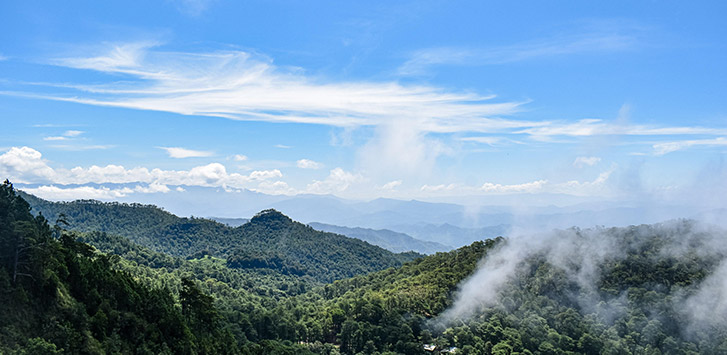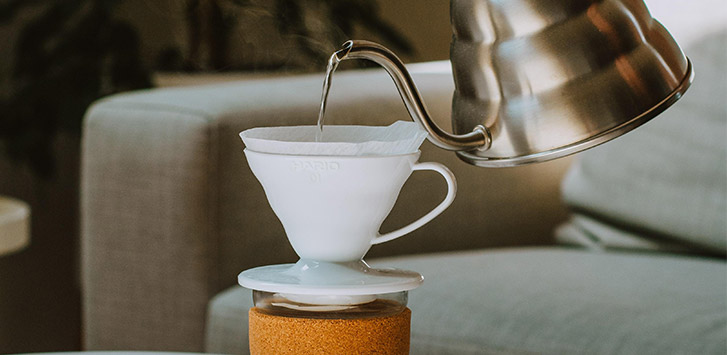.jpg)
A good cup of coffee has the power to change your day. And that’s exactly what a cup of single origin El Salvador coffee does. Unlike other Central American coffees, Salvadoran coffee coats your palate with soft, sweet notes, bellied by a light acidity.
This well-balanced coffee often gets overlooked because it lacks a "wow" factor. But it's perfect for those rainy days or those everything-seems-to-go-wrong days. Think of coffee from El Salvador as a trusted friend or comforting blanket; soft, sweet, and delicious.
History of El Salvador Coffee
Typica Arabica coffee was first introduced to El Salvador in the mid-18th century. When El Salvador finally became a coffee exporter in the mid-19th century, its coffee industry began to grow. By the 1950s, the country’s coffee exports were one of its main sources of income.
Peaking in the early 1970s, El Salvador coffee beans became known for their high quality. But El Salvador wasn’t able to enjoy its success for long. At the end of the 1970s, the country experienced great social and political turmoil. The El Salvador civil war displaced many coffee farmers who lived and farmed within the conflict zones.
Twenty years later, as the industry was rebuilding, coffee rust destroyed around 50% of its crops. Over the next ten years, through trial and error, coffee farms successfully produced healthy coffee crops again.
Farmers also pivoted to more sustainable practices during this time. Now, they focus on growing green coffee beans in the shade to reduce their need for pesticides. They've also replaced chemical-based fertilizers with organic compost made from the unused coffee cherries' pulp.
By the 2021-2022 coffee season, El Salvador was a major producer and exporter once again, with over 60% of its crops labeled as high-grown (HG) and strictly-high grown (SHG).
The El Salvador coffee industry is made up of three cooperatives – La Concordia, El Sincuyo, and Las Colinas. These cooperatives promote shade grown coffee and sustainable farming practices. All coffee growing regions are found within these cooperatives.
These days, El Salvador is the 19th largest coffee growing country in the world. In 2015, it produced well over 73,000,000 lbs., exporting over 81% of its crops.

El Salvador Coffee Growing Regions
Comprised of mountainous regions with rich, nutrient-dense volcanic soil, El Salvador has some of the best growing conditions for coffee. Coffee farms reside on mountains and hillsides thick with lush, forest vegetation, dark shade, and high altitudes. Coffee beans grown here are complex with rich flavors, intense sweetness, and mild acidity.
El Salvador coffee beans are grown in eight, main regions, including:
- Alotepec Metapan
- El Balsamo Quezaltepec
- Tecapa Chinameca
- Cacahuatique
- Chicontepec
- Apanexa Ilamatepec
- Apaneca
- Pecapa
Coffee Varietals
The best El Salvador coffee beans are grown at high altitudes, absorbing more of the nutrients in the rich, volcanic soil. Bourbon, Pacamara, and Pacas are the three most common El Salvador varietals.
Bourbon coffee is a high yield crop. The green coffee beans are a medium size and less dense than the Pacamara. When grown at a high altitude, Bourbon coffee beans have an excellent body, aroma, mild acidity, and balanced flavor notes.
Pacamara is a hybrid made from Paca and Maragogype coffees, created by the Salvadoran Institute of Coffee Research. These larger-than-average coffee beans produce a brightly acidic, complex coffee with good body and pervasive sweetness. The tasting notes are chocolate, honey, and cinnamon.
Discovered in Caturra in 1949, Pacas is a natural mutation of the Bourbon varietal. These beans brew a cup of coffee with an excellent body, rich aroma, bright acidity, and complex flavors.
In recent years, El Salvador has produced two more varietals to fight against the rise in coffee rust. The Catimor and Sarchimor are both resistant to coffee rust and boast a thick, pleasant body.
Flavor Profile
While every bean is a little different, El Salvador green coffee beans have mild and gentle flavor attributes. In most coffees, you'll be able to taste notes of nuts, chocolate, caramel, and fruit with a honey-like sweetness, balanced by a good body and mild acidity.
Our El Salvador Finca La Esperanza is grown in the Apaneca Ilamatepec mountain region by the Magana-Mendez family farm. With over 100 years of experience, the farm focuses on sustainable practices and high quality coffee beans above all else. This bourbon varietal has a sweet brown sugar essence with notes of cherry, green apple, and a hint of chocolate. The high acidity balances out the sweetness and medium body.
Our El Salvador San Cayetano coffee is grown by the Silva family on the San Cayetano farm, named by the founder Arturo Silva in the 1920s. Located in the volcanic region of Apaneca-Ilamatepec, the coffee is hand-picked and processed at the Silva’s mill. All coffee pulp is recycled and used as compost for the coffee plants later on. The San Cayetano is a sweet coffee with a syrupy body and notes of mixed berries, milk chocolate, and honey.
Our El Salvador Finca La Siberia is also from the San Cayetano farm! In contrast to the sweet, berry-forward San Cayetano beans, this coffee mixes berry tones with orange, melon, stone fruit, chocolate covered cherry, and honey.

Best Brewing Methods
Salvadoran coffee is relatively flexible but two of our customers’ favorite ways to brew their El Salvador coffee is in a pour over or as espresso.
The fine grind of a pour over with the drip method of brewing brings out the complex, nuanced, fruity flavors the best. But a dark roast espresso highlights the honey sweetness that defines El Salvador coffee. Either way, you can't go wrong. Just make sure you choose the right grind size, water temperature, and adhere to the normal, suggested brewing times!
Conclusion
El Salvador coffee has been an unsung hero for a long time. These richly sweet coffee beans are unlike their other Central American counterparts. Gently waking you up with the mellow acidity and delightful, well-balanced flavors, this coffee is sure to be a popular find.